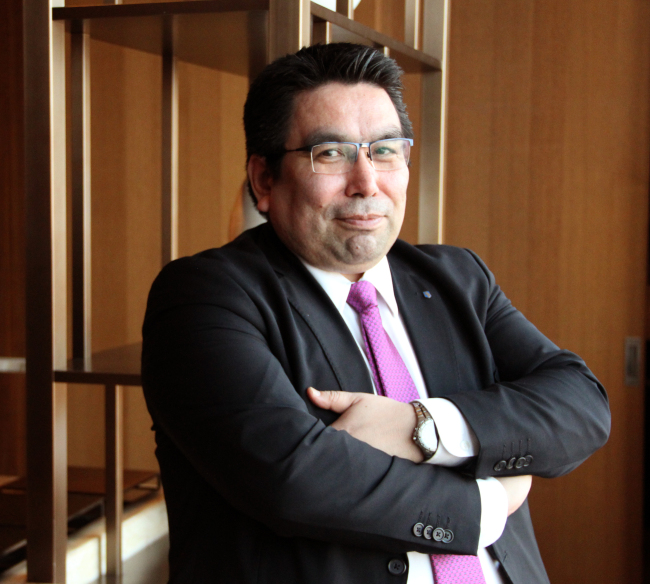Greenland enchants Korea with ice, fur and seafood
By Korea HeraldPublished : March 20, 2016 - 22:36
A delegation of Greenlandic government officials and businesspeople, led by Vittus Qujaukitsoq, minister for industry, labor, trade and foreign affairs, visited Korea last week to promote interest in tourism, fashion and food.
“Greenland as a beautiful tourist destination with its proud tradition of craftsmanship in fashion and design will be attractive to Koreans,” Danish Ambassador Thomas Lehmann said in a speech at a seminar at the Shilla Seoul on Wednesday.
Representatives from Visit Greenland, Air Greenland and Albatros Travel gave presentations on the country’s untamed assets -- northern lights, dogsledding, skateboarding, whale-watching, ice sheets, icefjords, fishing and pioneering Greenlanders -- while lanky Korean models dressed up in embroidered seal fur coats produced by Great Greenland cat walked in the room.
“Greenland as a beautiful tourist destination with its proud tradition of craftsmanship in fashion and design will be attractive to Koreans,” Danish Ambassador Thomas Lehmann said in a speech at a seminar at the Shilla Seoul on Wednesday.
Representatives from Visit Greenland, Air Greenland and Albatros Travel gave presentations on the country’s untamed assets -- northern lights, dogsledding, skateboarding, whale-watching, ice sheets, icefjords, fishing and pioneering Greenlanders -- while lanky Korean models dressed up in embroidered seal fur coats produced by Great Greenland cat walked in the room.



Delegates from the Royal Greenland and Polar Seafood showcased various seafood including cold water prawns, halibut, cod, haddock, king crab and salmon, which are caught and processed following corporal social responsibility and environmental sustainability principles.
In an interview with The Korea Herald, Qujaukitsoq highlighted opportunities in his country’s energy, natural resources, mining and infrastructure, as well as increasing exchanges in travel and education.
“South Korea being the 13th largest economy in the world,” he said, “we welcome your participation in research, development, trade and investment and environmental protection of Greenland.”
Noting that Korea is a Permanent Observer to the Arctic Council, the minister said the two countries have fleshed out four memorandums of understanding that cover investment, research and technological innovation in mineral resources. These were signed during former Korean President Lee Myung-bak’s visit to Greenland in 2012.
Qujaukitsoq added that educational cooperation received a boost after Korean Ambassador to Denmark Ma Young-sam visited Nuuk last May to inaugurate a facility housing Korean books, movies and music at the University of Greenland.
The University of Greenland and Yonsei University in Seoul exchange students and programs.

Qujaukitsoq pointed to the green energy, particularly hydropower, and joint business and research in sustainable technologies as potential sectors for future cooperation.
“We are working to diversify and strengthen our economy largely based on the fisheries into other areas, such as tourism, mining and mineral resources,” he stressed. “We also need to stop the outflow of people to Denmark, which can only happen by creating jobs, raising income, and increasing welfare.”
In 2013, Greenland lifted the ban on using mineral sources that had lasted over 25 years, and passed a Mineral Resources Act to utilize its vast reserves of rare earth materials, uranium and other radioactive elements.
Regarding climate change, the envoy said Greenland’s topography, ecology and economy were significantly impacted. The warming of sea waters has brought more fish to the benefit of fisheries. However it has also melted ice and shorter winter has threatened the existence of seals, polar bears, reindeers, caribous and muskoxens, along with the hunting industries that depend on them.
Greenland is the world’s largest island. It is over 21 times the size of South Korea and three-quarters of it is covered by a permanent ice sheet. It is an autonomous country within the Kingdom of Denmark.
With a population of 56,000, it is the most sparsely populated country in the world, with only three people per 100 square kilometers. Inhabited for at least 4,500 years by Arctic people, whose forebears came from today’s Canada, Greenland has been politically and culturally tied to Norway and Denmark.
The island nation became a Danish colony in 1814 after being part of Norwegian sovereignty since 1262. In 1979, Denmark granted home rule to Greenland.
On relations with Denmark, Qujaukitsoq emphasized that “there is a political aspiration toward full independence in Greenland.”
“It’s difficult to say when independence will be gained, but there is a need for restructuring our relationship with Denmark in terms of policy-making, based on our ideals and principles rather than the European Union’s,” he said.
“Under our present status, Greenland is not satisfied in terms of our equality in foreign policy and security matters, despite our important geopolitical position in the Arctic.”
In 2009, Greenland introduced a Self-Government Act that transferred power from Copenhagen to Nuuk, assuming responsibility for law enforcement, court, internal laws, border control and financial regulations, while relying on Denmark for foreign affairs and defense.
“There are contradicting developments that we need to manage, to ensure our position outside the EU,” he added.
By Joel Lee (joel@heraldcorp.com)


-
Articles by Korea Herald









![[Weekender] Korean psyche untangled: Musok](http://res.heraldm.com/phpwas/restmb_idxmake.php?idx=644&simg=/content/image/2024/05/02/20240502050841_0.jpg&u=)








![[Eye Interview] 'If you live to 100, you might as well be happy,' says 88-year-old bestselling essayist](http://res.heraldm.com/phpwas/restmb_idxmake.php?idx=652&simg=/content/image/2024/05/03/20240503050674_0.jpg&u=)
